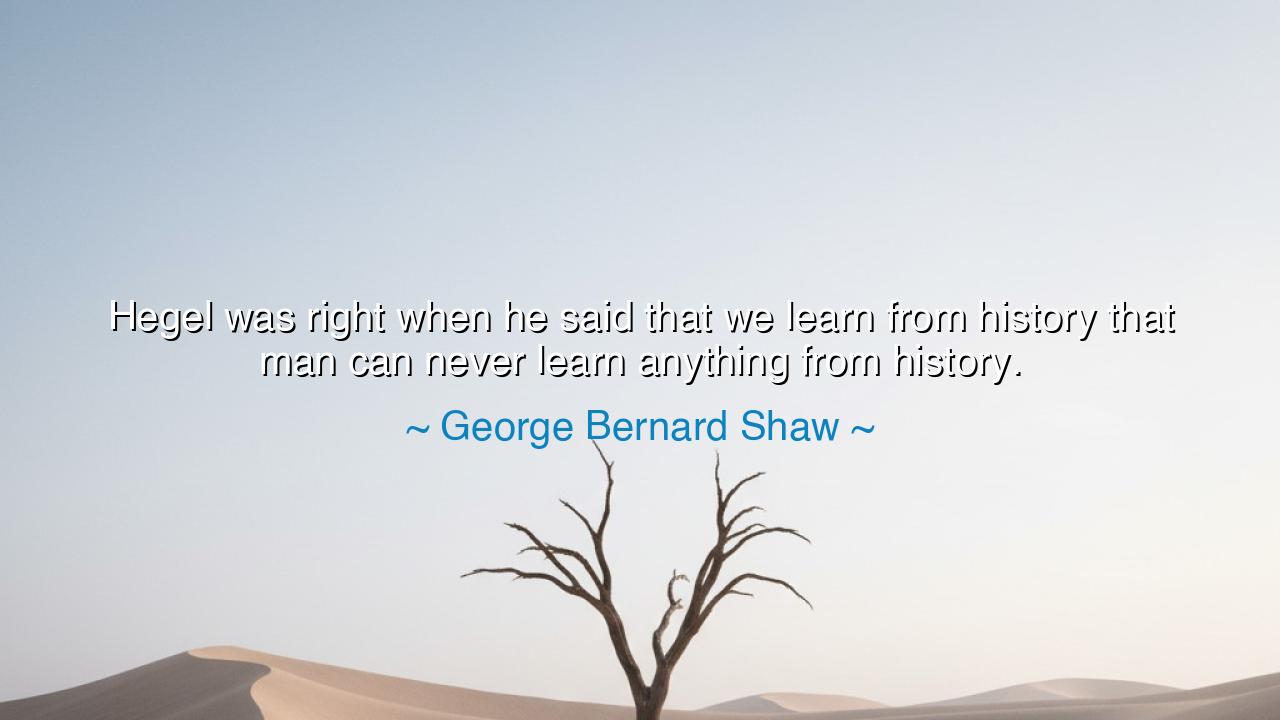
Hegel was right when he said that we learn from history that man
Hegel was right when he said that we learn from history that man can never learn anything from history.






Hearken, O seeker of wisdom, to the words of George Bernard Shaw, who, in his penetrating observation of mankind, invoked the shadow of Hegel to remind us of the eternal paradox: “We learn from history that man can never learn anything from history.” These words are not mere cynicism, nor idle mockery of human endeavor; they are the echo of ages, the lament of those who have watched empires rise and crumble, kings and nations repeat folly, and yet the hearts of men remain bound by the same errors. Shaw’s insight is a mirror, reflecting the stubbornness of human nature and the tragic repetition of our misjudgments.
From the dawn of civilization, mankind has chronicled its deeds—inscribed in stone, on parchment, in chronicles, and now in bytes and pixels. Yet, time and again, the same calamities revisit the earth. Consider the tale of Rome, that eternal city of glory and intellect, which rose with law, order, and vision, only to be undone by decadence, greed, and ambition unchecked. The senators and emperors, though they read the annals of their forebears, failed to heed the warnings of the past. So too did we witness Napoleon, that titan of strategy and ambition, marching across Europe, oblivious to the lessons of Alexander and Caesar, only to meet ruin in the Russian snows.
Shaw’s invocation of Hegel is thus a meditation upon human hubris. Hegel, the philosopher of dialectics, spoke of history as a river of ideas, flowing inevitably toward reason and enlightenment. Yet, Shaw reminds us with sharp irony that mankind’s memory is fragile; it erodes under the weight of desire and folly. We study history, yes—but we are seduced by the present, intoxicated by ambition, and blinded by the illusion that our era is exceptional, that our decisions are immune to the mistakes of the past.
This reflection is not merely about nations and emperors; it is about each soul who walks the earth. How often do we, in our personal lives, repeat errors despite knowing the wisdom of experience? The man who squanders wealth, the lover who betrays trust, the friend who refuses reconciliation—all enact the dramas of history upon a smaller stage. Shaw’s words are thus a caution, a plea for awareness, and a lamentation of the human tendency to ignore the guiding whispers of the past.
Yet, let not your heart fall entirely into despair, for wisdom also blooms from this recognition. We may not fully learn from history, but in witnessing its cycles, we gain the faintest glimmer of prudence. Consider the aftermath of World War I and the rise of fascism: the lessons were stark, yet humanity stumbled again into World War II. And yet, from this repetition arose the institutions of peace, the United Nations, the Geneva Conventions—a testament that even amidst our folly, progress emerges, however painfully, however slowly.
A practical teaching thus emerges: study history not merely to marvel at its events, but to train your perception, to sharpen your foresight. Read of empires that fell through avarice; learn of leaders who failed through pride; behold the common patterns of conflict, ambition, and neglect. And in your own life, strive to act with deliberation, humility, and reflection, knowing that while the past cannot guarantee salvation, it can illuminate paths less traveled, choices wiser made.
In the end, Shaw’s wisdom is both a mirror and a torch. It reflects the stubbornness of mankind, yet it illuminates the terrain upon which we must walk cautiously. If one embraces this paradox—acknowledging that we may never fully learn, yet striving always to observe and understand—the soul is strengthened. Walk among the chronicles of men with eyes unclouded, heart vigilant, and spirit prepared to resist the recurring tides of folly.
Thus, remember: history is our guide, though it may never teach perfectly. Study it, honor it, and apply it with mindfulness. Let not the repetition of error blind you to the lessons available; let the cycles of the past ignite a fire of reflection within, that you may, if not fully escape folly, at least navigate with courage, insight, and wisdom through the storms that are bound to return. Shaw’s words are a warning, a lament, and ultimately, a call to vigilance—the ancient teaching renewed for each generation.
If you wish, I can also craft a story-driven version, with a vivid narrative of historical figures and events illustrating Shaw’s paradox, making it even more engaging for audio narration. Do you want me to do that next?






AAdministratorAdministrator
Welcome, honored guests. Please leave a comment, we will respond soon